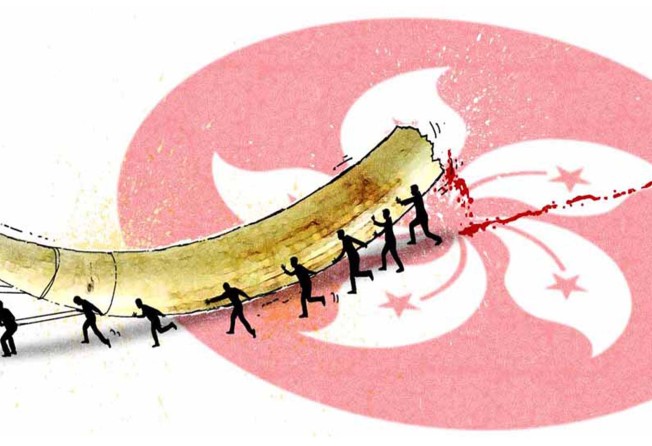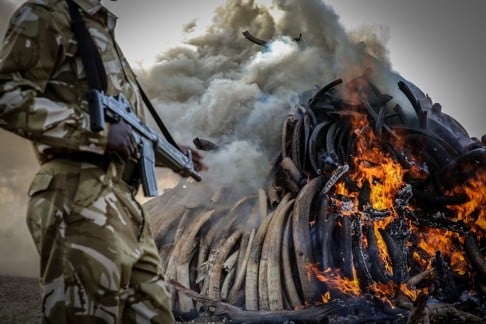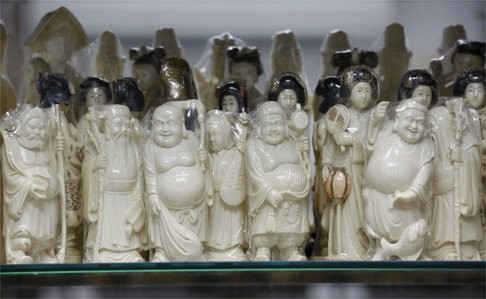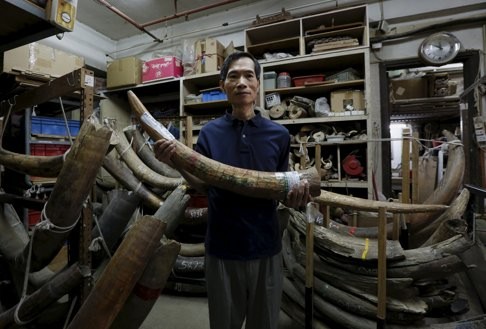An outright ban on the ivory trade in Hong Kong will deny smugglers a haven here
Gavin Edwards and Cheryl Lo say Hong Kong must outlaw the trade in ivory, as it’s the only effective way to save the planet’s fast-disappearing elephants

Last month, at the Congo’s Garamba National Park, a group of 10 rangers were tracking the signal from an elephant’s collar when it led them to a poachers’ camp. They found themselves outnumbered by the poachers who, having already slaughtered the elephant, opened fire on the rangers. Four men gave their lives in an effort to stop more elephants dying, leaving behind their wives and a total of 14 children.
This is not a one-off incident. Over the past 10 years, 1,000 rangers have been killed in the line of duty protecting wildlife and nature, which is almost two rangers a week. These rangers are fighting tirelessly for the future of elephants, yet they face a monumental task – more than 30,000 elephants are killed each year, primarily for their tusks, to satisfy the demand for ivory products in Asia.
How does this relate to Hong Kong? We have spent the past few months analysing the Hong Kong ivory market using government data and undercover footage obtained from independent investigators. The results are shocking. In the video we obtained, local ivory traders explain in great detail that they can smuggle ivory and rhino horn to order, direct from Africa, how they can circumvent the government’s attempt to regulate their business, how they can use their legal business as a front for illegal activity, and how easily ivory can be smuggled into mainland China from Hong Kong. Our findings demonstrate that there are many systemic flaws in the way the Hong Kong ivory trade is regulated, and leads us to conclude that it’s time for the government to ban ivory trade across the city.

For example, the government will deploy eight sniffer dogs at the border to detect smuggling of illegal ivory. However, 60 million tourists visited Hong Kong last year, of which 47 million were from the mainland (who are the vast majority of buyers of ivory). Hence, customs officers, together with the eight sniffer dogs on duty, face an almost insurmountable task of identifying which of these visitors are taking ivory purchases over the border illegally.

The government has also committed to sampling ivory to ascertain its age. A piece of ivory can be sent to an overseas laboratory to estimate its age through radioisotope testing. However, the test is a destructive sampling method and would physically destroy a chunk of ivory. Therefore, it is not a very practical test for much of the ivory on sale: small pieces need to be destroyed while larger ones would be devalued.
A common theme with these new initiatives is that each becomes the seed of future problems in the regulation of the ivory market.

Governments around the world are coming to the conclusion that, in the face of such a crisis, baby steps aren’t enough. In September, President Xi Jinping (習近平) and US President Barack Obama agreed to “take significant and timely steps to halt the domestic commercial trade of ivory” during a meeting in Washington. The world leaders’ determination to save wildlife has quickly yielded results, such as the high-profile arrest by Tanzanian authorities of the so-called “Queen of Ivory”, a Chinese woman alleged to be the kingpin of the illegal ivory trade and a major link between poachers, the black market and international buyers for the past 14 years. Such actions will send shock waves through the organised crime networks. But one country’s efforts alone cannot save the elephants. Only concerted international action can halt wildlife crime in the long run.
To humans, ivory is not a necessity, but the consequences of the ivory trade can lead to the extinction of the largest land animal. Conservationists are working hard to change the culture with public education and by gathering petitions calling for a ban. The Hong Kong government recently announced that it is “open-minded on the ban on domestic trade”. While this is encouraging news, it must move quickly from an open mind to shutting down the ivory trade, to create a sustainable future for this mighty animal. People should understand the hard truth about ivory, sign the petition and rewrite the future for African elephants.
Gavin Edwards is conservation director and Cheryl Lo is senior wildlife crime officer at WWF-Hong Kong